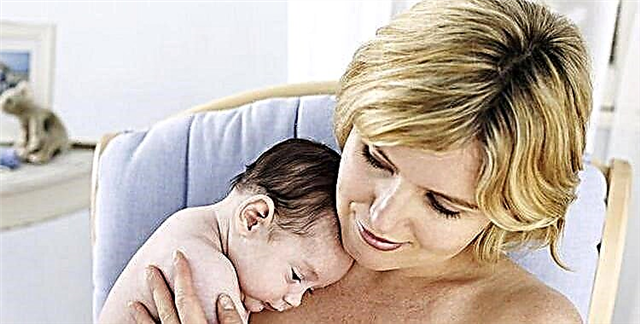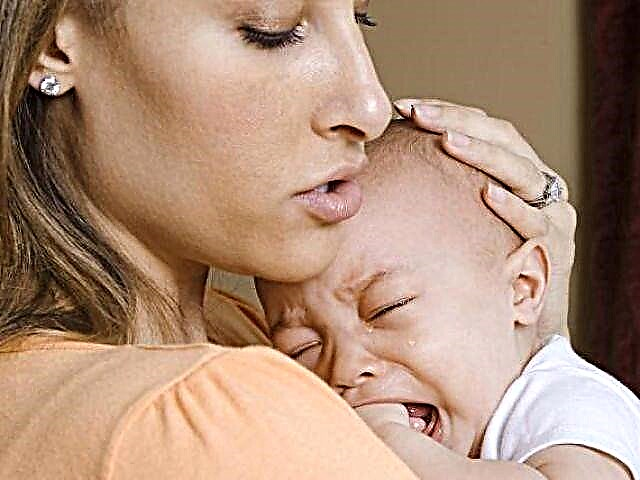Often parents ask a questions:
- What does black feces mean in a child?
- Can he talk about some kind of disturbance in his digestive system?
- Is it worth worrying if a newborn has dark stools?
- Could this indicate the presence of blood in the stool?
The answers to these questions are found in the text of the article.

Sick baby
Features of the digestive system of a newborn
The color of the stool of the crumbs depends on what the baby or his mother ate (with HB). When breastfeeding, the child defecates "big" much more often - up to eight times a day. Physiologically, defecation is associated with feeding.
In a baby on artificial feeding, defecation occurs less often. The color of the stool in this case is darker. Regardless of the type of feeding, the crumbs should not have blood, mucus and other impurities in the stool.
It is highly recommended that you begin feeding your newborn with breastfeeding. This contributes to the formation of the correct intestinal microflora. As a result, the risk of digestive disorders in adulthood is minimized.
Normal baby bowel movements
The concept of normal stool in infants is rather relative. For the first time, a baby defecates within the first 12 hours after birth. This stool is called meconium. This first stool in a newborn is approximately black, odorless, and consists of amniotic fluid, epithelium and fluids from various parts of the gastrointestinal tract. It has a dark green color that may be mistaken for black by the parents of the baby. Its consistency is viscous.

Meconium in newborns is normal
Further, the stool changes to yellow and mushy. The mass is homogeneous. There can be no lumps in it, and normally there are no residues of breast milk. With artificial feeding, the stool may be brown, that is, dark, not necessarily black, baby stools may form.
Reasons for discoloration of feces
The set of reasons that affect the shade of feces is huge. In some cases, it is impossible to reliably determine whether dark colored stools are the norm. An important diagnostic criterion is the child's well-being. If he refuses to eat, cries, looks weak, this is a reason to see a doctor. You should understand the possible reasons for the change in the color of feces in more detail.
Physiological
Physiological causes are those that normally affect your baby's stool color. They are as follows:
- Certain types of complementary foods, especially if they are not tolerated by the baby's body. There may not even be a pathology here, as some parents give babies bananas, blueberries and other berries too early, when their digestive system is not ripe. This can cause cloudy stools.
- Meconium. The same chair of newborns, which was discussed above.
- Intake of fortified milk formula containing iron.
- What mom eats. Some of the foods she eats change the composition of breast milk. Consequently, there is a change in the characteristics of the baby's feces.
In most cases, there is no cause for concern. It is important to pay attention to the health of the crumbs.
Pathological
If we talk about the pathological causes of blackening of the stool, then it is caused by the presence of blood in the feces. This may indicate the following violations:
- Internal bleeding (rare in infants).
- Reaction to certain medications.
- Food allergies, in particular, children may not tolerate cow's milk and soy.
- Intestinal infections and poisoning. So, bloody stools can appear with salmonellosis or the presence of Clostridium difficele. Formula feeding increases the likelihood of infectious diseases because breast milk prevents bacteria from developing.
- Colitis. This is a class of diseases in which tissue in the intestines becomes inflamed or damaged. It can develop as a complication of intestinal infections, and as an independent disease. A particularly dangerous condition is ulcerative colitis, in which, in addition to the presence of blood in the stool, there is an increase in body temperature, increased fatigue. The frequency of trips "by and large" is very high - up to 15-20 times a day. Due to such severe diarrhea, dehydration occurs. The condition requires an ambulance call. While the parent is waiting for her, he must recover the loss of fluid.

Baby in diaper
Important! Blackening of the stool can also indicate very serious health problems. Therefore, when changing its color or consistency, it is recommended to consult a doctor.
What the color of feces signals
Dark feces in a child can symbolize illness, and even more so than is commonly believed. In the case of babies, things are not so bad because they get sick less.

Poor diaper stool color
The black
Black poop in a child should alert parents. While this may be part of the norm, it is best to see a doctor. The only exception is if the child is newborn, in the first days he is observed in the hospital.
Black green
This type of dark stool in a child, if found in babies who were born only a few days ago, is natural. If the baby is older (more than 6 months old), then a green tint may appear due to the characteristics of complementary foods. Black-green stools form if your baby eats too many fruits and vegetables. Sometimes it becomes so due to intestinal infections or dysbiosis.
Dark brown
In most cases, this is a variant of the norm. The chair should be brown. Any deviations towards yellowness or blackness should be considered as a manifestation of a possible disease.
Why does a child have black feces in the first days of life
In the first days of life, a child develops meconium, which includes epithelial cells, hair, mucus, bile and water. This black stool in babies is completely normal. Meconium was considered completely sterile for a long time, but after a while this fact was denied. The bacteria in it are more useful than harmful, and determine the primary formation of the baby's immunity.
For meconium, a sticky consistency is characteristic, as well as a complete absence of odor. During the first days of life, it leaves, after which the child's feces should become normal.
Dangerous symptoms
If we are talking about infants, especially newborns, if you have the slightest doubt, you should immediately consult a doctor. The fact is that their body is weaker, therefore, diarrhea, harmless for an adult, can cause severe dehydration and death in a baby up to a year old. The same goes for vomiting. The following symptoms should also alert:
- Elevated temperature. It accompanies some types of intestinal infections. In combination with dehydration, it is especially destructive, as blood can clot.
- The presence of blood. It can be either scarlet or dark. In the latter case, this is the reason for the blackness of the stool.
- Profuse regurgitation, especially if almost all the milk came out immediately after eating.
- Lack of appetite.
- Lethargy.
Important! Do not self-medicate, especially when it comes to a child. Moreover, you shouldn't give him antibiotics. The children's doctor Yevgeny Komarovsky, known for his books on pediatrics, spoke about the danger of self-administration of antibacterial agents.
Many diseases cannot be accurately diagnosed by symptoms alone, therefore additional examination methods are prescribed. Only a doctor can reliably determine which ones are needed.
Thus, black stools in a child may indicate serious illnesses. But don't panic ahead of time. You need to watch the baby and, if something happens, take him to the doctor.



